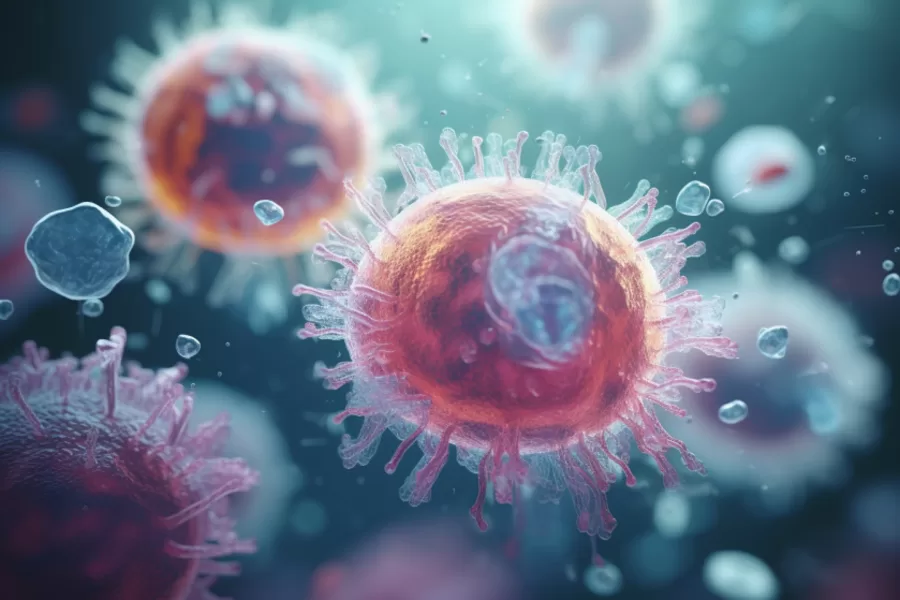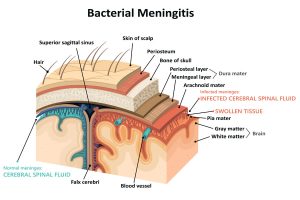During the COVID-19 pandemic, we learned the hard way how dangerous viruses can be. But about other causes of infectious diseases? Today we are talking about bacterial infections, the importance of early detection and proper treatment, and how devastating a neglected condition can become.
Understanding Bacterial Infections
What is a bacterial infection? It is a health issue when a harmful bacteria finds its way inside a human body and starts multiplying. The organism responds to this, and the immune system tries to fight off the infection. The process can manifest with a set of different symptoms that vary depending on the type and location of the contagion. For example, strep throat would cause difficulty swallowing, fever, redness in the throat, etc. Bacterial vaginosis can lead to unpleasant odors, uncommon vaginal discharge, itch, and a burning feeling during urination. And food poisoning could result in vomiting or diarrhea. The disease can also have an asymptomatic course which complicates its detection.
How Bacterial Infections Occur
Our body has a pretty good natural defense system. The first line of protection against hostile bacteria is our skin. When the integrity of skin layers is broken (e.g., in case of cuts and burns), the risk of infections grows. The other path for bacteria to enter is through places that are not protected by the skin: the gastrointestinal tract, airways, mucous membranes of reproductive organs, urinary tract, or even eyes. Even then the immune system and the body structure itself provide some protective measure. If everything proves insufficient for whatever reason (too many bacteria, compromised immune status, etc.), the bacteria count will grow, and the person becomes infected.
Untreated Bacterial Infection Symptoms
Persistent, or untreated bacterial infections are diseases that were not treated properly, as the name suggests. The pathogens continue to thrive, causing further health deterioration and secondary conditions. This leads to the development of new, much more severe symptoms that require immediate medical attention:
- High fever or, to the contrary, chills (low body temperature, often accompanied by shaking);
- Limb swelling;
- Signs of altered mental status, such as seizures, loss of consciousness, or confusion;
- Changes in heart rhythm (too fast or irregular);
- Liitle to no amount of urine;
- Weakness, difficulty breatung;
- Red and hot skin, abnormal rash;
- Pus discharge.
Complications of Untreated Bacterial Infections
Complications of untreated bacterial infections include much more than just a negative health impact. However, it is a lot on its own. Moreover, by neglecting their condition, knowingly or not, the patient puts in danger both themselves and the people around them.
Prolonged illness and discomfort
If the infection presents itself with symptoms, the longer you wait to treat it, the longer you suffer the symptoms. And it could be quite a burden to bear, drastically changing your rhythm and quality of life. Imagine bacterial vaginosis (BV) untreated for months. Itching and irritation are a huge issue as is—add the imminent effect it will have on one’s intimate life and relationships.
Spread of Infection
Bacterial infections are contagious. By contacting with other people, those you live, work, and communicate with, you can spread the infection to them. Think about the infamous Typhoid Mary. She was a cook who infected over 50 people with typhoid fever due to her being an asymptomatic carrier.
Another, more down-to-earth example, is STI. Chlamydia and gonorrhea are caused by bacteria. Practicing unsafe sex means that you can give your partner an infection. The same occurrence is quite likely if you kiss someone with strep throat. The bacteria will be transmitted to a new potential host, and the possibility of infection is very high.
Severe Health Conditions
If bacteria consider your body a good medium to grow, they will not linger just in one place. Untreated infections tend to spread over your organism, reach vital systems and enter the bloodstream. The condition with living harmful bacteria in the blood is called bacteremia. Untreated bacteremia will develop into such grave conditions as systemic inflammatory response syndrome (SIRS), sepsis, septic shock, and multiple organ dysfunction syndrome (MODS).
Another thing is life-long consequences that affect a patient’s well-being even if the infection is not life-threatening. For instance, long-term effects of untreated BV include tissue damage in the fallopian tubes which causes infertility.
Antibiotic Resistance
Antibiotic resistance, or AR, is an occurrence of bacteria being immune to antibiotic therapy. It can happen if the contagion agent was already resistant, the person practiced self-treating with antibiotics, used them wrong, or did not finish the course. Some bacteria, such as Staphylococcus aureus, can naturally quickly adapt to treatment and become resistant.
AR is a huge problem because it complicates therapy, prolongs the time of illness, and forces doctors to use the most powerful medications and combinations of them which causes more adverse reactions and can be expensive.
Secondary Infections
Secondary infection is a condition acquired after the primary contagion and connected to it in a way. Most often it happens due to the weakened state of the immune system. For example, untreated BV infection makes patients more prone to STIs, such as chlamydia and gonorrhea. Another case is when the disease creates more entry points for bacteria, e.g. manifests with a rash that can be easily infected.
Economic Impact
A prolonged disease affects one’s ability to perform at work or even to attend at all. This decreases their outcome, putting an economic strain on the household. Moreover, treatment of persistent bacterial infections often results in high hospital bills which further deepens the matter. Potent expensive drugs, many tests, and other medical services often are not covered by an insurance plan, and the person has to pay out of pocket.
Causes of Untreated Bacterial Infections
In short words, there are two reasons why the disease remains untreated: unawareness and negligence.
Lack of early detection
At the early stage, when the disease is the most treatable, it often can run without any symptoms that raise an immediate red flag. Some infections, including STIs, often have an asymptomatic course. A condition could be detected through deliberate screening or during a physical exam when the doctor can spot abnormalities, but that requires the patient to be willing and proactive.
Signs and symptoms ignored
Oftentimes, the symptoms do manifest but the patient does not consult their doctor. The reasons for this can vary. The person can:
- have a chronic condition and think that symptoms are connected to it;
- be physically exhausted and write the symptoms off as a consequence of the situation;
- be overwhelmed with work, house chores, care for children or an ill relative and put these tasks over their health;
- can be afraid of doctors and avoid them;
- can be financially compromised or not insured, so they are not able to afford treatment, etc.
Misuse or non-completion of antibiotics
This can happen when the patient did not use the prescribed medication properly. Because of that, antibiotics can work not as effectively as they should, and the bacteria persist and develop resistance. Also, the patients often stop taking antibiotics after they feel better which results in incomplete infection eradication with the same result.
Prevention and Treatment
The following measures can significantly lower the risk of developing a persistent bacterial infection.
Early detection
Timely diagnosis is key to handling the infection at its early stage when it can be managed easily. It is quite often cheaper, and it saves the patient from much discomfort and prevents further complications.
To detect the disease as soon as possible, one should not dismiss their symptoms. Health issues that have an asymptomatic course can be spotted through testing and abnormalities discovered during screening. This is why it is important to have an ongoing dialogue and cooperate with your primary care doctor and visit for checkups regularly.
Proper use of antibiotics
To prevent bacteria from developing antibiotic resistance, always follow the doctor’s recommendations carefully and go over the full medication course. Do not take antibiotics without a prescription.
Public health measures
WHO defines public health measures as “measures or actions by individuals, institutions, communities, local and national governments, and international bodies to slow or stop the spread of an infectious disease”. These measures include:
- Proper hygiene and self-care: wash your hands, do not touch your face when your hands are not clean, and keep your skin healthy and moisturized.
- Spread prevention: avoid sharing personal items, such as a toothbrush. When sneezing and coughing, cover your face with an elbow. Wear a mask if you have to leave home when you are sick.
- Vaccinations. Many infectious diseases can be prevented through vaccination.
- Reduce the risk of contracting the infection: drink clean water, eat properly cooked and processed food, and sanitize and dress minor wounds in time.
- If you are sexually active, practice barrier protection and get tested regularly.
- Communicate and cooperate with your doctor for other preventive and holistic measures; regularly visit your healthcare facility for screening.
- Fact sheets and other educational content meant to raise awareness, either printed or digital.
Summary
Untreated bacterial infection can cause devastating consequences to the well-being of an individual and their close ones. Productive cooperation with your doctor, good hygiene, and self-education on the matter of your health can help lower the risk of persistent infectious diseases. In case you notice possible signs of a disease, call your doctor as soon as possible.
FAQ
What can an untreated bacterial infection cause?
It can endanger the health of those close to the patient, impact the patient’s quality of life, create long-term complications, and cause severe illness.
How long can a bacterial infection last without treatment?
Without treatment, an infection can be only eliminated by the patient’s immune system which is unlikely because the disease makes it weak. Otherwise, it will persist causing more complications that can potentially result in the patient’s demise.
Can you survive a bacterial infection without antibiotics?
Antibiotics are a primary line of treatment for bacterial infection; managing without them has very little possibility of success.
Can you have a bacterial infection for years?
It is possible. Many STIs, for example, are left unchecked for years and are discovered along with the complications they caused.
Can an untreated infection kill you?
Yes, untreated infections can cause sepsis and other grave conditions.




